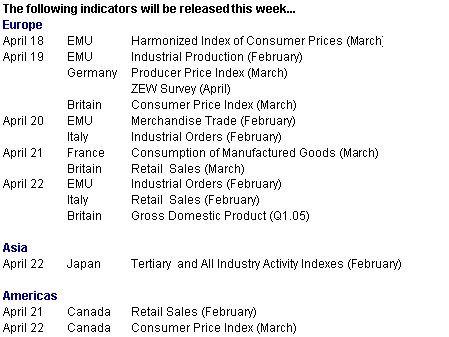Monday, April 18, 2005

Bank of Canada maintains 2.5 percent - currency drops
The Bank of Canada kept its interest rate unchanged at 2.5 percent on Tuesday. The decision keeps the rate 25 basis points below the U.S. equivalent, the Fed Funds rate which is currently 2.75 percent. The Bank said data received since its previous announcement on March 1st indicate that the Canadian and global economies have been evolving largely as expected.

The Bank of Canada singled out currency gains since 2002 that have made exports more expensive as a factor in the country's slower economic growth. The Bank said it still plans to raise interest rates eventually. The Canadian dollar has risen 20 percent in the past three years to about 81 U.S. cents, crimping exports that make up 40 percent of the country's economy. The Canadian dollar reached a 12-year high of $0.8532 on November 26, 2004. Since then, the loonie has dropped about 5.5 percent.
Last week, the Canadian dollar continued to weaken. Investors were disappointed that Canadian interest rates would not be moving higher any time soon. Now the currency trading is being driven by expectations of higher U.S. interest yields. Speculation that the interest-rate differential or spread will favor the U.S. has helped push Canada's currency to its lowest in five weeks. Another negative for the currency is the growing scandal surrounding Prime Minister Paul Martin's minority Liberal Party government which could force an election, possibly in May. The Canadian dollar has been declining since testimony showed that the Liberals received kickbacks. The markets still have not completely absorbed what the longer-term implications will be and how the government will change.

The Bank of Canada, in its quarterly monetary policy report, cut its 2005 economic growth forecast to 2.6 percent from 2.8 percent because of slowing exports. It pledged to raise interest rates over time to keep inflation in check. The Bank also said the past appreciation of the Canadian dollar is expected to continue to dampen growth of Canada's exports and to boost import growth. Regarding inflation, the Bank expects prices for its core consumer price index measure to climb to 2 percent by the end of next year (Consumer prices excluding eight volatile items rose 1.8 percent in February from a year earlier.)
Canadian equities have also been buffeted recently, but more in response to commodity price fluctuations. Stocks have been particularly affected by oil's swan dive. Investors fretted that declining prices for copper and other metals could dampen earnings growth among raw material producers. And technology stocks such as Nortel also dragged the index down especially after IBM and Sun Microsystems said their quarterly results trailed estimates.

Global Markets
World equity markets retreated last week as investors worried about the U.S. economic outlook and corporate earnings. So far, the mixed start to the earnings season for U.S. companies added to worries generated by poor retail sales and confidence data released during the week. The health of the U.S. economy has replaced oil prices at the forefront of investor worries for now. World markets were also weighed down by weakness in mining and energy stocks following the drop in metal and crude oil prices. All 13 indexes followed here were down on the week, with several losing all of their 2005 gains.

Global Stock Market Recap

Europe and Britain
Stocks in Britain and Europe went into reverse last week, with the FTSE, CAC and DAX sinking 1.8 percent, 2.2 percent and 2 percent respectively. With few earnings reports available, investors dwelt on weaker retail sales and consumer sentiment in the U.S. The indexes were also pulled down by first-quarter earnings worries, especially in technology. Technology stocks continued to be hit hard after a disappointing earnings report from IBM. In Britain, the general election campaign is in full swing and while Tony Blair's Labour Party is expected to win on May 5th, political events tend to make investors equivocal. Investors don't like uncertainty!

Concerns about retail stocks were magnified when in London, Apax Partners walked away from its takeover bid for Woolworths. European stocks were affected by the cancellation as well, but were also affected by lower oil and chemicals stocks even though losses were partially offset by gains in the pharmaceuticals sector.
Asia/Pacific
Asian/Pacific equities were down last week as investors mourned weaker-than-expected U.S. retail sales and lower consumer confidence. They opined that soaring energy prices have finally gotten the best of U.S. consumers. Japanese stocks suffered their worst week in almost a year. Computer-related companies sank after Samsung Electronics and IBM missed expectations. Exporters followed U.S. stock indexes down on worries that growth in the U.S. could be slowing. Both the Nikkei and the Topix dropped 4.2 percent this week, their biggest weekly declines since the period ended May 14, 2004. Tokyo hit its lowest level in seven weeks, with sentiment bruised by the ongoing tension between Japan and China, its biggest trading partner.

Australia's all ordinaries index sank last week as copper and crude oil prices fell. BHP Billiton and Woodside Petroleum Ltd and other mining companies led declines. Now the index has lost all of its 2005 gains and then some after metals prices slumped on concern a slowdown in the global economy will curb demand for raw materials. The index was down 3.7 percent on the week. The index has dropped 6.5 percent from a record high set March 21st, the day before the last Federal Reserve rate increase to 2.75 percent that sparked concern commodities demand would slow.

Currencies
The dollar remained relatively resilient last week despite investor worries about the sustainability of U.S. consumer spending. But perhaps it could be a reflection of yen and euro weakness rather than dollar strength given the anemic growth in Japan and Europe. The euro is suffering from growing concerns that failure to ratify the new EU constitution in referendums in France and the Netherlands might spell a period of uncertainty surrounding the EU. According to the Financial Times, the EU is drawing up contingency plans in case France or the Netherlands vote "no" on the constitution.
After rising during the week despite tepid economic data, the dollar capitulated Friday after the Federal Reserve Empire State index dropped to a two-year low. But the losses were limited after a U.S. Treasury report showed that total foreign purchases of U.S. assets dipped a bit less than expected in February. Given the yield differentials between the U.S. and Japan and Europe, one would expect assets here to be favored.

Higher U.S. interest rates make carry trades less attractive, and speculators continue to unwind these deals, which in turn is helping the dollar. These trades involve selling borrowed dollars to invest in assets denominated in higher-yielding currencies. Rising interest rates make these carry trades more costly.
Japanese investors purchased �932.9 billion worth of foreign bonds and �100 billion of foreign equities in the week ending April 8th, putting pressure on the yen. When foreign purchases of Japanese bonds and equities were taken into account, net outflow of funds from Japan was the largest since November.
Indicator scoreboard
EMU - Fourth quarter 2004 gross domestic product was up 0.2 percent and 1.6 percent when compared with the previous year, unchanged from the previous estimate.

France - February seasonally adjusted industrial output was down 0.5 percent but up 1.2 percent when compared with last year. Manufacturing output sank 1 percent but was up 1.6 percent on the year. Semi-finished goods, autos, capital goods and consumer goods output were all down on the month as were the food sector and construction.

February seasonally adjusted merchandise trade deficit was �1.52 billion, larger than January's �1.22 billion. Exports were up 0.7 percent while imports were up 1.6 percent. Energy imports jumped 7.7 percent thanks to higher prices and cold temperatures.

Italy - February seasonally adjusted industrial output was up 0.1 percent but down 2.5 percent when compared with last year. Consumer output was down 0.9 percent while capital goods output was flat. Eight of 18 product sectors were up on the month including paper & newspaper publishing, utilities and furniture. Among those product sectors that declined were coal & petroleum, transportation equipment, food, beverages & tobacco and textiles & clothing.

February merchandise trade deficit improved to �1.4 billion from �2.3 billion in January. Exports were up 3 percent while imports jumped 5.2 percent.

Britain - March producer output prices were up 0.6 percent and 2.8 percent when compared with last year. Prices were up mainly due to increases for gasoline, tobacco and alcohol. Excluding food, tobacco, beverages and gasoline products, output prices were up 0.1 percent and 2.4 percent on the year. Input prices jumped 1.8 percent and soared 11.5 percent on the year. Crude oil prices were up 15 percent and 51.2 percent on the year.

February global merchandise trade deficit eased to Stg4.809 billion from Stg5.070 billion in January. Exports were down 0.2 percent while imports dropped 1.3 percent. Including services, the trade deficit narrowed to Stg3.259 billion from Stg3.457 billion in January. Total exports were down 0.5 percent while imports sank 1.1 percent.
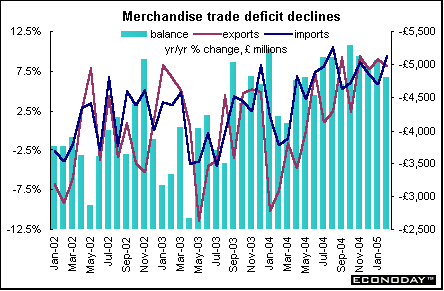
March claimant count unemployment jumped by 11,000 while the claimant unemployment rate inched up to 2.7 percent from 2.6 percent in February. For the three months through February, International Labour Organization unemployment was up 29,000 when compared with the previous three months through January. The ILO unemployment rate edged up to 4.8 percent from 4.7 percent. Employment for the same three months was up by 148,000.
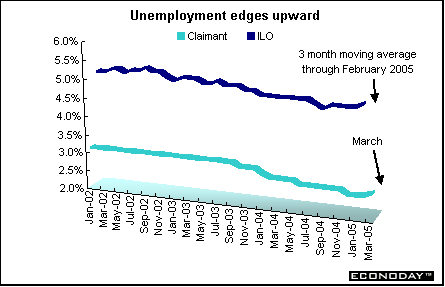
Average earnings for the three months ending in February were up 4.7 percent when compared with the same three months a year ago. For the month of February, earnings soared 5.7 percent on the year. The jump was attributed to increased bonuses in the financial sector. Excluding bonuses, average earnings were up 4.3 percent.
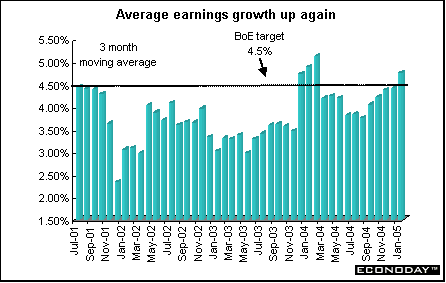
Asia
Japan - March corporate goods price index was up 0.3 percent and 1.4 percent when compared with last year. Producer prices continue to climb, squeezing profits. Domestic CGPI was up 1.5 percent in the fiscal year ended March 31st. That was the first increase since 1997 and the biggest gain since 1989.
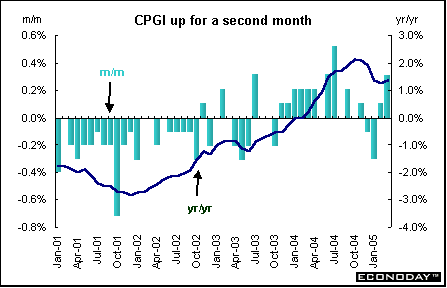
February industrial production was revised to a decline of 2.3 percent from the drop of 2.1 percent when originally reported. On the year, industrial production was revised to an increase of 3.7 percent from 3.2 percent originally reported.
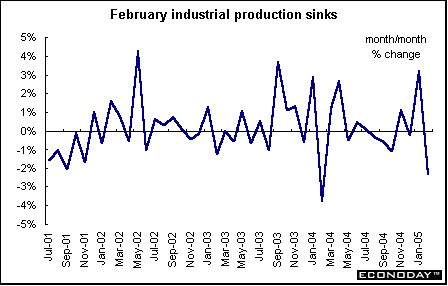
Americas
Canada - February merchandise trade surplus climbed to C$4.8 billion ($3.9 billion) from C$4.3 billion in January. Exports rose 1.4 percent to C$36.5 billion in February, led by a 4.8 percent jump in exports for agricultural and fishing products. Energy exports increased 1.3 percent to C$6 billion. Imports declined 0.2 percent to C$31.7 billion as Canadians bought fewer automotive products from abroad. The trade surplus with the U.S. widened to C$8.7 billion from C$8.1 billion.
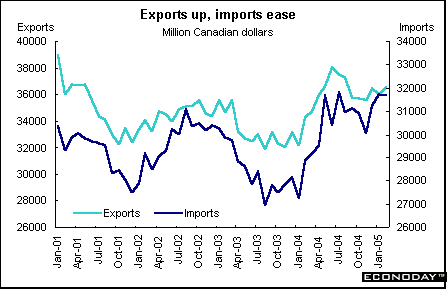
February factory shipments dropped 0.5 percent but were up 10.8 percent when compared with last year. Excluding the transportation equipment sector, shipments edged up 0.3 percent. Motor vehicle shipments declined 3.4 percent after soaring by 5.7 percent in the previous month. Twelve of 21 manufacturing industries accounting for 66 percent of total shipments posted modest declines. Other industries reporting lower shipments in February included petroleum and coal products (down 1.8 percent), paper (down 2.0 percent) and aerospace products and parts (down 3.8 percent). Unfilled orders also declined 0.5 percent, again mainly because of weakness in the transportation equipment sector. Excluding the transportation equipment sector, unfilled orders were up 1.8 percent for the month.
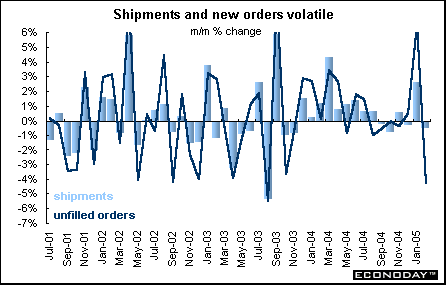
Bottom line
In May citizens in Britain and Europe will be going to the polls to vote. In Britain, the national election is scheduled for May 5th, with Prime Minister Tony Blair widely expected to be returned to office, although he could have a much reduced parliamentary majority.
The first votes on the European Union draft constitution are scheduled in France on May 31st and the Netherlands on June 1st. Polls indicate the constitution could be defeated in either or both countries. The constitution must be approved unanimously by all 25 members in order to become law. A clear 'no' could plunge the EU into a crisis, resulting in volatility in currency and bond markets and probably downward pressure on the euro.
Looking Ahead: April 18 through April 22, 2005
